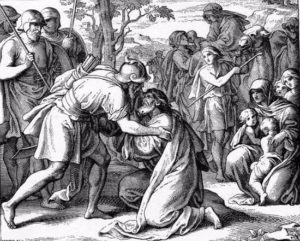In this week’s parasha, Vayera, the word “love” appears for the first time in the Torah. There is a general rule that when a certain term appears for the first time in the Torah, the context in which it appears can teach us the true meaning of that term. Nothing is coincidental, of course, so if a word makes its first appearance in a particular place, this is where to look in order to understand its significance. It is specifically when God puts Abraham to the test that the Torah tells us Abraham loved his son Isaac (Genesis 22:2). There is much we can learn from this. Continue reading
Tag Archives: Rebecca
The Shiluach HaKen Dilemma
In this week’s parasha, Ki Tetze, we read about the famous mitzvah of sending away the mother bird:
If a bird’s nest happens upon you on the way, in any tree or on the ground, chicks or eggs, and the mother-bird is sitting over the chicks or the eggs, do not take the mother together with her young. You shall surely send away the mother bird, and take the young for yourself, so that it will be good for you and your days will be lengthened. (Deuteronomy 22:6-7)
 There are actually two mitzvahs here: not taking the mother together with her children (a negative mitzvah), and sending away the mother bird before taking the children (a positive mitzvah). The Torah does not explain the rationale here, but for most of history the message seemed quite obvious: don’t be cruel! It was so obvious that the Mishnah (Berakhot 5:3) states we should stop people from requesting in their prayers that since God has mercy on birds, He should also have mercy on us. The Rambam (Rabbi Moshe ben Maimon, 1138-1204) comments here that the reason one shouldn’t pray this way is because it is seemingly giving a reason for the mitzvah, yet we do not know the true reason for the mitzvah, except that it is God’s Will. Moreover, the Rambam points out that if it is a matter of mercy, then God should have commanded us not to slaughter or eat any animals at all! Continue reading
There are actually two mitzvahs here: not taking the mother together with her children (a negative mitzvah), and sending away the mother bird before taking the children (a positive mitzvah). The Torah does not explain the rationale here, but for most of history the message seemed quite obvious: don’t be cruel! It was so obvious that the Mishnah (Berakhot 5:3) states we should stop people from requesting in their prayers that since God has mercy on birds, He should also have mercy on us. The Rambam (Rabbi Moshe ben Maimon, 1138-1204) comments here that the reason one shouldn’t pray this way is because it is seemingly giving a reason for the mitzvah, yet we do not know the true reason for the mitzvah, except that it is God’s Will. Moreover, the Rambam points out that if it is a matter of mercy, then God should have commanded us not to slaughter or eat any animals at all! Continue reading
Did Jacob Kill Esau?
In this week’s parasha, Vayishlach, the Torah records the final encounter between the twins Jacob and Esau. This takes place when their father, Isaac, passes away and “is buried by his sons, Esau and Jacob.” (Genesis 35:29) Following this, the Torah presents a detailed genealogy of Esau and the various future chiefs of Edom. Nothing more is said of Esau. It is the Talmud (Sotah 13a) that describes how his life came to an end.

